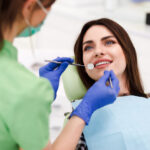Large study reveals new bacterial species in cavity formation
 (NaturalHealth365) Over a quarter of adults in the United States suffer from cavities, indicating a concerning oral health situation. Additionally, a staggering 50% of adults aged 30 and above exhibit symptoms of gum disease, further highlighting the severity of the issue. Even adolescents and teenagers are not immune, with nearly 15% having untreated tooth decay.
(NaturalHealth365) Over a quarter of adults in the United States suffer from cavities, indicating a concerning oral health situation. Additionally, a staggering 50% of adults aged 30 and above exhibit symptoms of gum disease, further highlighting the severity of the issue. Even adolescents and teenagers are not immune, with nearly 15% having untreated tooth decay.
To tackle these challenges and gain deeper insights into tooth decay, experts from the University of Pennsylvania School of Dental Medicine joined forces with researchers from the University of North Carolina. Their collaborative efforts resulted in an important discovery: the bacterial species known as Selenomonas sputigena plays a significant role in the development of tooth decay. This finding could pave the way for advancements in dental health and treatment methods.
Study sheds light on tooth decay: A surprising bacterial duo behind cavities challenges previous beliefs
Until now, it was widely believed that tooth decay primarily resulted from the actions of Streptococcus mutans, a bacterium known for producing acid and contributing to plaque formation. However, the recent study published in Nature Communications has brought a surprising revelation: Selenomonas sputigena, previously associated mainly with gum disease, works in tandem with Streptococcus mutans, creating a far more potent catalyst for cavity development.
This unexpected finding has profound implications for both the academic community and the general public, shedding new light on the process of cavity formation. Dental caries, commonly known as cavities, represent the most prevalent form of chronic disease among children and adults in the United States and worldwide. Therefore, the study’s insights are valuable for everyday individuals striving to maintain good oral health.
With this newfound knowledge, dentists can now take more effective measures to prevent tooth decay. While Selenomonas sputigena is not the sole cause of cavities, its interaction with Streptococcus mutans accelerates and exacerbates the decay process. Consequently, addressing the presence of both bacterial species becomes crucial in combatting cavity formation and promoting better dental health.
Prevent cavities by harnessing novel insights for healthier smiles
With the groundbreaking study providing crucial revelations about bacterial biofilm formation and the potent combination of Selenomonas sputigena and Streptococcus mutans in cavity development, the path to cavity prevention has never been clearer.
Dentists are now leveraging these findings to devise innovative teeth-brushing techniques, while oral health experts are intensifying their research on enzyme-based approaches to disrupt the harmful bacterial duo. Furthermore, a deeper understanding of how Selenomonas sputigena establishes itself on the tooth surface is driving additional efforts by dental professionals and researchers to enhance oral health.
Try these natural approaches to promote healthy teeth
Balanced diet: Consume a well-balanced (organic) diet rich in vitamins and minerals, particularly calcium and phosphorus, which are essential for strong teeth and enamel. Include plenty of fruits, vegetables, nuts, seeds, sprouts and clean sources of protein (and fats) into your diet.
Limit sugary and acidic foods: Minimize your intake of sugary and acidic foods and beverages, as they can contribute to tooth decay and erosion. This can prove to be quite helpful at reducing tooth decay.
Oil pulling: Try oil pulling with coconut or sesame oil for 10-15 minutes, daily. Swishing the oil in your mouth can help remove harmful bacteria and promote oral hygiene. Just be sure to spit the oil out into a garbage bag, not your sink, to avoid plumbing issues.
Herbal mouth rinse: Use an herbal mouth rinse with ingredients like neem, myrrh, or tea tree oil, which have antimicrobial properties and can help maintain a healthy oral environment. Or, as an alternative, apply a drop of an essential oil blend on and around your gums with ingredients like, peppermint and clove.
Probiotics: Incorporate probiotic-rich foods or supplements into your diet to promote a healthy balance of oral bacteria and improve overall oral health.
Avoid smoking and excessive alcohol: Obviously, smoking and regular alcohol consumption can have detrimental effects on oral health, leading to various dental issues.
Stress management: Stress can contribute to teeth grinding (bruxism), which can wear down enamel. Practice stress-reduction strategies like meditation, yoga, deep breathing or a consistent form of any exercise.
Hydration: Drink plenty of clean water throughout the day to maintain proper saliva flow, which helps protect teeth and neutralize acids.
Natural toothpaste: Consider using fluoride-free, natural toothpaste with ingredients like baking soda and essential oils to clean and protect your teeth.
Remember that while natural methods can complement traditional dental care, regular visits to a well-trained biological dentist are essential for thorough check-ups and professional cleanings.
Editor’s note: Discover the best ways to correct oral health problems … own the Holistic Oral Health Summit, created by NaturalHealth365 Programs and featuring many of the best biological dentists in the world.
Sources for this article include:



